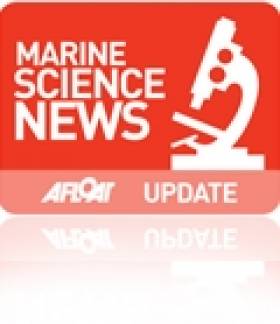Displaying items by tag: UK ferryports
Dredger Arrives to Port of Waterford following Maintenance Campaigns at UK South Coast Ferry Ports
A dredger was tracked arriving to the Port of Waterford today, following works carried out in UK south coast ferry ports on the English Channel, however this week work is to start along the Waterford Harbour estuary, writes Jehan Ashmore.
The trailing suction hopper dredger Freeway according to the Port of Waterford, is to conduct a maintenance dredging campaign in the vicinity of Belview, Cheekpoint and Duncannon Bar and with the spoil to be disposed at an approved site offshore of Hook Head, Co. Wexford. The scheduled dredging as Afloat reported last week, has been contracted to Cork based Irish Dredging, a subsidiary of Boskalis.
Freeway’s forthcoming dredging work, follows campaigns along the English south coast, where in Portsmouth, Hampshire, the Royal Navy’s main base, along with ferry terminal operations to France, Channel Islands and Spain, is where two vessels along with Freeway carried out surveying and maintenance dredging works within the port’s harbour and channel approaches.
On that occasion, the dredging for Portsmouth Port was contracted to Royal Boskalis Westminster Group which had disposed of the spoil to a designated site offshore to the east of the Isle of Wight.
Following this campaign, the Cypriot flagged Freeway, was also tracked by Afloat last week, as the 2015 built dredger headed to Newhaven in East Sussex, where the yellow hulled, Transmanche Ferries, operated by DFDS, at the start of this year, won a five-year contract to continue running the 'public service' obligation route to Dieppe. The historic ‘London-Paris capitals service’ can be traced to the joint UK-France railway operated route, dating to 1862, which geographically is the most direct between the capitals, which is currently served by Côte d'Albâtre.
Transmanche's twin ferry, Seven Sisters, Afloat tracked down to the Normandy port’s Bassin de Paris where it is in layover period so far for the winter, while DFDS also operate out of other northern French ports, Calais and Dunkirk, both linking Dover. In addition, the Danish operator with an extensive European route network, among them the Dunkirk-Rosslare Europort connection.
The dredging works according to the Newhaven Port Authority were scheduled to take around five days and were completed at the English Channel port (closest to London), on the River Ouse, which involved disposal of spoil to a site south off the port’s breakwater from where Freeway passed when departing on Sunday evening bound for Waterford.
By yesterday evening, the 92m Freeway was offshore of Lizard Point, Cornwall before entering Waterford Harbour today at lunch hour to berth at Belview, downriver of the city.
For further details of the Port’s maintenance dredging campaign, click here.
Ferry Operator Assists in Marine-Life Conservation Role
Fastnet Line which runs the Cork-Swansea port route on the Celtic Sea, is assisting the charity MarineLife to monitor cetaceans, writes Jehan Ashmore.
The work of MarineLife is to survey the population trends and track the movements of dolphins, whales, porpoises and other wildlife. The research is undertaken onboard Fastnet Line's Julia (1981/21,699grt) and access to the ferry is provided free-of-charge to the wildlife-based charity.
During the months of July and August the ferry's schedule will allow for further opportunities to conduct daylight sightings of marine-life which is to be posted on MarineLife and Fastnet Line websites.
Adrian Shephard, Chairman of MarineLife Trustees, said: "The route from Swansea to Cork crosses a range of marine habitats and we hope it will generate many sightings of cetaceans and seabirds, including two important species we monitor, the white-beaked dolphin and the balearic shearwater".
In addition monitors recently observed fin whales, the second largest whale on the planet. Such sightings provide vital information and this will contribute to a better understanding of the distribution of cetaceans and other marine life in the Celtic Sea. To read more www.marine-life.org.uk
The first of four summertime surveys is to take place on 10 July. Overall the research by MarineLife is part of a larger project which also involves the use of other ferries operating in the Irish Sea and those serving on UK continental routes.
The 1,500 passenger / 325 car-carrying Julia sails year-round six times a week between September to June and from next month and during August the vessel will provide eight sailings per week. For fares and sailings schedules contact www.fastnetline.com






























































